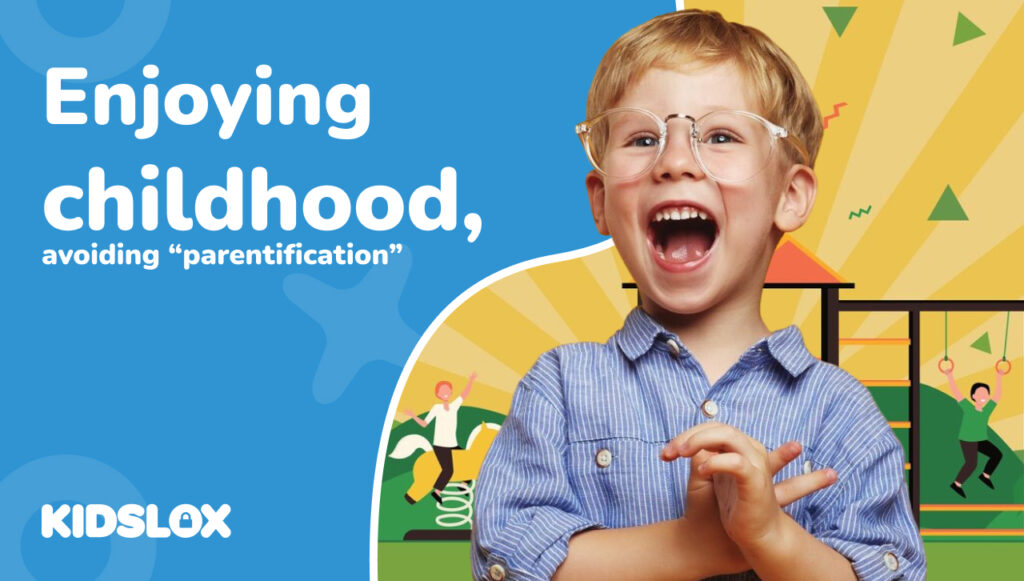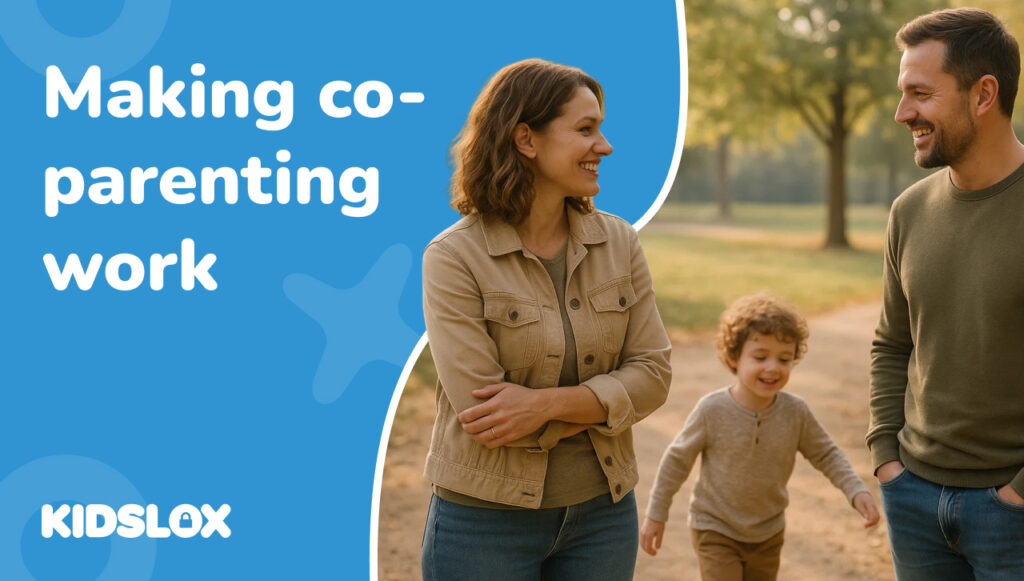Understanding What Happens When Children Become Caregivers
At its core, parentification happens when the roles in a family become reversed — when a child is expected to meet emotional or practical needs that should belong to the parent. It can show up subtly, or it can shape entire childhoods. It might even be something you’ve carried from your own upbringing into your current parenting.
In this guide to, we’ll explore what parentification means, the difference between healthy responsibility and harmful role reversal, and how it affects children both in the moment and later in life. We’ll also look at how it’s being discussed online by those who have experienced it, how it overlaps with things like ‘older sibling syndrome’, and most importantly, how to begin healing from parentification.
Types of Parentification: Emotional vs. Practical
Parentification can take several forms, but psychologists typically divide it into two main categories: emotional parentification and practical parentification. Both involve a child stepping into roles that aren’t appropriate for their age or development — but they affect children in different ways.
Emotional Parentification
Emotional parentification is often the hardest to spot, and arguably the most damaging long-term. It happens when a child becomes responsible for a parent’s emotional wellbeing — acting as a confidant, therapist, or even partner substitute.
Children in emotionally parentified roles might:
- Regularly comfort a parent through stress, depression, or relationship problems.
- Be relied on for adult-level emotional support (“You’re the only one who understands me”).
- Feel responsible for keeping the peace in the household.
- Be exposed to adult issues like financial insecurity, addiction, or infidelity.
This kind of ‘parenting a parent’ is often invisible to outsiders — and sometimes even to the parent themselves. But for the child, it creates pressure, anxiety, and a premature sense of responsibility that can lead to low self-worth and burnout over time.
Practical Parentification
Practical parentification is more visible. It refers to situations where a child takes on physical or logistical caregiving duties beyond what’s developmentally appropriate. This might include:
- Cooking, cleaning, or running errands regularly.
- Managing household bills or appointments.
- Looking after siblings like a substitute parent (often called older sibling syndrome).
- Taking responsibility for an ill, addicted, or absent parent.
Some level of responsibility can be healthy — many children benefit from chores, caring for a pet, or helping younger siblings occasionally. But the line is crossed when it’s ongoing, necessary for the family’s functioning, and without adequate support or recognition.
It’s important to recognise that in some cultures or family structures, children helping out is common and expected. The difference lies in degree, frequency, and impact. Parentification becomes problematic when the child’s emotional needs are consistently sidelined, and they are not allowed to just be a child.
Signs of Parentification — How to Know When It’s a Problem
It’s not always easy to tell when helpful behaviour tips into something unhealthy. Many parentified children appear mature, reliable, and emotionally intelligent — but beneath the surface, they may be quietly struggling.
Here are common signs a child may be experiencing parentification:
- They seem “wise beyond their years” or unusually adult-like in conversations.
- They’re overly focused on keeping family members happy or emotionally stable.
- They worry excessively about money, health, or adult responsibilities.
- They suppress their own needs to avoid burdening others.
- They show signs of anxiety, perfectionism, or burnout.
- They’re constantly helping or caring for others — often without being asked.
In Teens:
- They take on household management roles beyond typical expectations.
- They become the “go-to” emotional support for a parent or sibling.
- They’re left to raise or discipline younger siblings (classic older sibling syndrome).
- They find it difficult to set boundaries or express needs.
- They feel guilty or selfish when focusing on themselves.
In Adults Reflecting on Childhood:
- A strong sense of needing to be “the responsible one.”
- Difficulty relaxing, trusting others, or asking for help.
- Persistent feelings of guilt, shame, or emotional exhaustion.
- Patterns of over-functioning in relationships (especially romantic or caregiving roles).
- A deep belief that love is earned through usefulness or sacrifice.
If you see yourself in any of these, you’re not alone. Many adults are only just discovering the long-term effects of parentification trauma — and realising how it shaped their understanding of love, safety and self-worth.
What Causes Parentification — and When It Crosses the Line
Parentification doesn’t always come from neglect or malice. Often, it arises in families where parents are struggling — emotionally, financially, or physically — and the child naturally steps in to fill a gap. But over time, those roles can harden into something damaging.
Common Causes of Parentification:
- Mental health issues in a parent (e.g., anxiety, depression, PTSD)
- Chronic illness or disability in a parent or sibling
- Addiction or substance misuse in the household
- Divorce or single parenting, where one parent relies emotionally on the child
- Immigration or language barriers, where children often interpret or manage tasks for adults
- Economic hardship, where older children must work or manage the home
- Grief or family trauma, such as the loss of a parent or caregiver
In these situations, the child’s maturity and empathy may be praised — but when a child’s development is defined by what they can do for others, it can lead to lasting emotional strain.
So, where is the line between healthy responsibility and harmful ‘parenting a parent’? The key is choice, consistency, and support.
Occasional responsibility, with clear appreciation and adult backup = healthy.
Ongoing emotional or practical responsibility, without support or recognition = parentification.
If a child is consistently sacrificing their own emotional needs, social development, or sense of safety in order to care for a parent or sibling, the line has been crossed — no matter how quietly it happened.
And while some degree of maturity can be empowering, children are not emotionally equipped to manage adult problems. That role reversal can affect their sense of identity and relational patterns for years to come.
Is Parentification Abuse? Understanding the Debate and Its Impact
One of the most common — and controversial — questions asked online, especially in forums like parentification Reddit threads, is: Is parentification abuse?
The answer isn’t always simple.
Parentification exists on a spectrum. At one end, it may involve light responsibilities that temporarily help a family function. At the other, it can become a form of emotional neglect or role reversal so profound that it meets the criteria for emotional abuse.
Whether it qualifies as abuse depends on:
- The severity and duration of the role reversal.
- The developmental age of the child when it occurs.
- The presence (or absence) of support, recognition, and choice.
- The impact on the child’s emotional or physical wellbeing.
For example, expecting a teenager to help with younger siblings occasionally may be appropriate. Expecting a child to act as therapist, disciplinarian, or sole caregiver — especially at the expense of their own needs — crosses into abusive territory.
Narcissistic Parentification
In some cases, particularly in families where a parent has narcissistic traits, the dynamic becomes even more harmful. This is known as narcissistic parentification, where the child exists primarily to validate or serve the emotional needs of the parent.
This may include:
- Constantly being praised for being “mature” while being denied the freedom to be a child.
- Being guilted for asserting boundaries or showing emotion.
- Feeling valued only for what they do for others, not who they are.
In these cases, the child may internalise the belief that love is conditional — tied to performance, helpfulness, or emotional labour — which can have serious implications for future relationships.
Even when the intention behind parentification isn’t abusive, the impact often is. That’s why recognising it matters — not to place blame, but to start healing.
The Long-Term Effects of Parentification on Children and Adults
Children who experience parentification often grow into adults who are capable, empathetic, and deeply responsible. But beneath that surface, many carry invisible scars — patterns of stress, guilt, and hyper-independence that trace back to a childhood spent putting others first.
Psychological and Emotional Impacts:
- Anxiety and burnout from years of internalised pressure to manage others’ needs.
- Low self-esteem, particularly if their efforts were never recognised or reciprocated.
- Guilt and shame for wanting independence, rest, or emotional support.
- Difficulty identifying personal needs after years of emotional suppression.
- A tendency toward perfectionism or people-pleasing, in and out of relationships.
Relational Impacts:
- Caregiver roles in adult relationships, often becoming the “fixer” or emotional anchor.
- Fear of vulnerability, believing they must always be strong or in control.
- Resentment toward family members, especially when boundaries weren’t respected.
- Avoidant or anxious attachment styles, stemming from inconsistent emotional safety.
Professional and Social Impacts:
- Overachievement or overwork as a form of self-worth validation.
- Difficulty trusting teams or delegating responsibility.
- A feeling of being “different” from peers, especially in adolescence or early adulthood
- Avoiding rest, leisure or self-care due to internalised beliefs about productivity and value.
Even those who consider themselves “high functioning” may find that their past experiences of being parentified have shaped how they show up in the world — often in ways that put their own needs last.
Recognising the long-term effects is a crucial step toward change. And that change is possible.
Healing from Parentification — What Recovery Can Look Like
Whether you’re recognising signs of parentification trauma in yourself or trying to prevent it in your child, healing begins with awareness — and with the understanding that it’s never too late to rewrite the script.
Healing often starts by validating your experience. Many parentified adults downplay what they went through, especially if their family needed help or if they were praised for being “the strong one.” But recognising that your needs were sidelined — even unintentionally — is the first step in reclaiming them.
Here are some strategies for healing:
- Therapy or counselling with a practitioner experienced in family systems, trauma, or inner child work.
- Journaling to explore where your sense of worth has been tied to service or self-sacrifice.
- Learning to set boundaries — especially with family — without guilt.
- Reconnecting with your own wants, needs, and hobbies, beyond what you do for others.
- Surrounding yourself with relationships where care is mutual, not one-sided.
Healing from parentification doesn’t mean rejecting your family — it means recognising what you missed, and giving it to yourself now.
If you’re a parent who was parentified — or who worries you may be placing too much on your child — change starts with small, intentional shifts.
- Reflect on where you might be leaning emotionally on your child. Can those needs be met elsewhere?
- Make space for your child to express emotions and set boundaries without fear of punishment or guilt.
- Let kids help, but within age-appropriate limits, with clear appreciation and the freedom to say no.
- Celebrate your child for who they are, not just what they do.
- Model asking for help, resting, and making mistakes — show them that adulthood doesn’t require perfection.
Talking About Parentification — Resources, Language, and What to Do Next
The term parentification might not have been in your vocabulary until recently — but for many families, the experience has been there all along. Opening up the conversation, whether with a partner, therapist, or even your child, is a powerful step toward breaking intergenerational patterns and building healthier relationships.
How to Start the Conversation:
- With yourself: Was I parentified? How did that shape the way I show up now?
- With a co-parent or caregiver: Are we unintentionally putting too much on our child?
- With a therapist: I think I was emotionally parentified. I want to understand how it’s affecting me.
- With your child (age-appropriately): I want you to know that it’s not your job to worry about me. It’s okay to just be a kid.
Using the right language helps frame the issue clearly and compassionately. Phrases like “role reversal,” “emotional pressure,” or “adult responsibility too soon” can be useful starting points, especially when talking with those unfamiliar with the term.
If you’ve read this far, you’re already doing the work. Recognising what parentification means, how it shows up, and how it feels is the first step toward creating something different — for yourself, and for your family. Whether you’re parenting a child or reparenting yourself, you deserve relationships built on care, not pressure.






